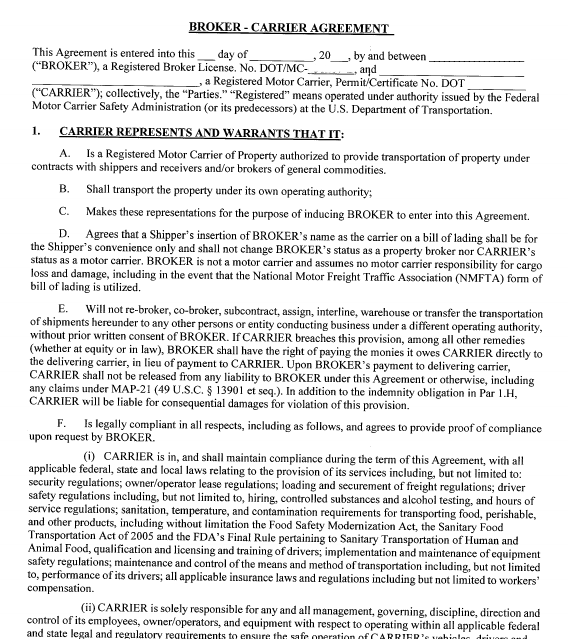
Be on the look out for any requirement to provide Additional Insured and/or a Waiver of Subrogation by any broker or customer.
As Todd Dills and I discussed in his Just say no: One owner-operator’s approach to broker/customer demands to be ‘additional insured’, brokers and customers frequently require to be added to our policy as an additional insured. This is a covert means to gain free insurance from us as well as avoiding financial responsibility when or if they cause us bodily injury or property damage. Personally, as an Independent Owner Operator myself, I choose to never do business with any broker or customer who, as a condition in the agreement or contract, requires to be added to my policy as an additional insured.
A lesser known, but even worse, condition often included in a broker’s or customer’s agreement or contract is something called a waiver of subrogation. Many are completely unaware of the potential adverse consequences of providing a waiver of subrogation to a broker or customer. Subrogation is a legal tool used by an insurance company to recover losses it paid out to an insured (a claim) from a liable third party who is responsible for those losses. I know that is a bit wordy and complicated. So lets first start with the definition of Subrogation.
merriam-webster.com’s definition of Subrogation;the assumption by a third party (such as a second creditor or an insurance company) of another’s legal right to collect a debt or damages.
When discussing insurance, and specifically an insurance policy, a waiver of subrogation is an endorsement. Similar to a COI (certificate of insurance), the insurance carrier will provide a copy of the waiver of subrogation to the broker or customer who has requested and been granted the waiver.
The best way to show the dangers of granting a waiver of subrogation to a customer or broker is by example. So lets use the same example I used in Todd’s Just say no story.
An owner-op checks in at his direct customer’s facility. “They say back into door 37,” Baker said, and “door 37 has an overhang outside of it.” While the owner-op’s backed in, “the overhang collapses and lands on his trailer.”
The customer then claims “hey, we didn’t give you that door,” saying the owner-op misheard 37 instead of 57. “It’s not our fault. You need to contact your insurance company.”
The owner-op submits a physical damage claim to his own insurance, yet manages to provide sufficient proof to the insurance company that the failed dock overhang was in fact the one that the shipper sent him to. The insurance company says, “Hey, ACME Widgets Inc., you’re responsible. Pay up or we’ll sue” for the cost of the loss.
In the case of a broker asking to be added as an additional insured, keep in mind, too, that given possible affiliations that broker has with bigger businesses, you may be giving away more than you think.
For the sake of this article the broker or customer was not added to the policy as an additional insured. However, they did require and were provided a waiver of subrogation. Notice the bold sentences? That is precisely what subrogation is. Now if we give the broker or customer a waiver of subrogation then our insurance company can not force Acme Widgets, Inc. to reimburse them (our insurance company) for the settlement of the claim.
Why does that matter? Because that claim and settlement will now be a permanent black mark on our insurance history by appearing on both our loss runs and CLUE (Comprehensive Loss Underwriting Exchange) reports. Loss runs are a report of claims history on a given policy. A CLUE report is generally a report containing up to seven years of personal-auto and personal-property claims history and up to five-year commercial loss run histories. Insurance companies rely heavily on both of these reports when they determine if they can provide a quote for coverage and if they do provide a quote, what the premium for that quote will be.
The consequence of that black mark will most likely be an increase, which is frequently quite significant, on our future insurance premiums for years to come.
The first thing every truck owner should ask when a broker or customer requires a waiver of subrogation is why? To me the answer is obvious. Either they have a fear that they could be financially responsible for bodily injury or property damage to any truck owner they do business with or they were held financially liable by the means of subrogation and forced to reimburse an insurance company. Both of which are huge, bright red flashing warning lights signaling “ENTER AT YOUR OWN RISK!”
So for me, if a customer asks for a waiver of subrogation, my answer is the same as when they ask to be added as Additional Insured. Always, NO!
